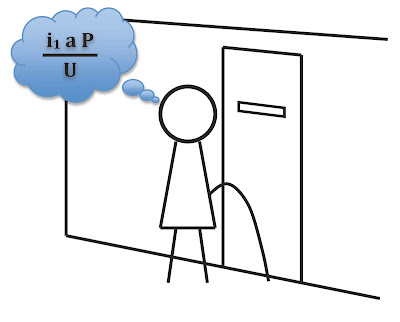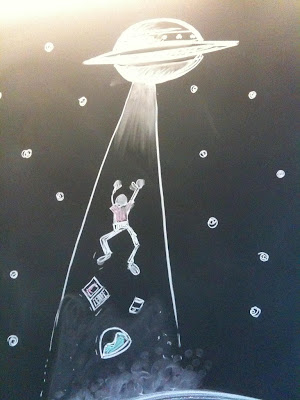So, you may have heard about Tihomir Petrov, the math professor at Cal State, Northridge who was arrested for urinating on his colleague’s office door. Campus security got video footage of Petrov in the act when they set up video cameras following the discovery of “puddles of what they thought was urine.”
You may be asking yourself, what the heck was this dude thinking? How should we interpret the behavior of this Homo mathematicus (not that there’s anything wrong with it) specimen?
 |
| What Professor Petrov was probably thinking. |
Fortunately, once again, Science!™ has an answer for you. Urine is commonly used as a scent marker to deter competitors. But deter them from what? Traditionally, it has been assumed that scent marking is primarily used to defend territory against intruders, thereby safeguarding resources such as food and space. However, some recent studies have suggested that scent marking may be used to defend mates and mating opportunities. One of the difficulties in studying such a question, however, is that in many systems, competitors for territory and competitors for mates are the same individuals.
A recent study by a group of researchers in the UK, Uganda, and Switzerland have attempted to separate out these two forms of competition in a study of the wild banded mongoose. This species lives in large social groups that share a territory. Thus territorial competition occurs primarily between different social groups, whereas competition over mates occurs primarily within groups.
 |
| “Anal gland secretion (AGS) and urine samples were collected under anaesthesia during routine trapping events” Image licensed under creative commons from Mike Rohde’s Flickr photostream. |
The researchers found that the mongoose populations marked uniformly throughout their territory, and did not appear to increase the frequency of marking in those regions where two territories overlapped. This suggests that, in this species at least, defense of mates and mating opportunities represents a major contribution to scent-marking behavior, perhaps more so than territorial defense.
So, can we extrapolate from the behavior of the wild banded mongoose to the behavior of wild banded mathematician Tihomir Petrov? Of course we can! Should we extrapolate? Absolutely not! But, here at Lost in Transcription, we’re all about the possible, so here is the take-home message. Castle and Beckett should look beyond professional disputes between the two mathematicians. They need to be looking at the love-triangle angle (Love angle4?) for motive.
Alternate theory: As Northridge is, like, the pr0n capital of the country, Petrov might not have been the original urinator. When he saw that the cameras had been set up, he might have assumed that he had been cast in a movie, and that peeing on the floor was what was expected of him. Just sayin’.
Jordan, N., Mwanguhya, F., Kyabulima, S., Rüedi, P., & Cant, M. (2010). Scent marking within and between groups of wild banded mongooses Journal of Zoology, 280 (1), 72-83 DOI: 10.1111/j.1469-7998.2009.00646.x